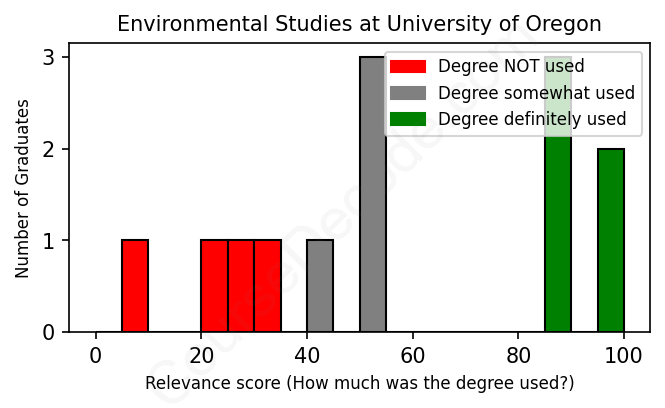
First, some facts. Of the Environmental Studies graduates from University of Oregon we've analyzed , here's how many have used (or NOT used) their degree in their career:

These are estimates based on AI analysis of 13 LinkedIn profiles (see below).
The verdict? Significantly below average. Overall, with an average relevance score of 56%, Environmental Studies graduates from University of Oregon have a much lower likelihood (-11%) of finding work in this field compared to the average graduate across all fields:
And for comparison, here's the chart for all profiles we've looked at across all degrees.
Also, after graduating, only 30% of these graduates have pursued further education other than another Bachelor's degree (such as a Masters degree or other), compared to the average across all profiles of 35%. This suggests a Bachelors degree is enough for most Environmental Studies graduates, and it's normal to look for work straight after graduation.
See the details:
|
Relevance score: 42% We think this person has gone into a career only somewhat relevant to their degree. We think this person has gone into a career only somewhat relevant to their degree.
DEGREE INFOGraduated in 2016 from University of Oregon with a Bachelor of Science (BS) in Environmental Studies. No other secondary education since. JOB HISTORY SINCE GRADUATIONAssistant Server King Estate Winery May 2016 - Sep 2016 Research Intern  King Estate Winery Jun 2016 - Oct 2016 Wine Educator  King Estate Winery Jul 2016 - Nov 2016 Cellar Hand  King Estate Winery Sep 2017 - Nov 2017 Bartender/Server  Taco Vino Jan 2017 - Apr 2018 Wine Sales Representative  The Wine Shop and Beer Tasting Bar Jun 2018 - Aug 2018 Cellar hand intern  Flaneur Wines Aug 2018 - Nov 2018 Distiller  Bendistillery, Inc. Nov 2018 - Aug 2019 Bartender  Boxwood Kitchen Mar 2019 - Sep 2019 Sales Representative  NORTHWEST NEGOCIANT PROJECT, LLC Apr 2020 - May 2021 Central Oregon Account Manager  Grape Expectations, Inc. Sep 2019 - Present Account Manager  HUNDRED SUNS WINE LLC Jul 2019 - Present ABOUTNo information provided. |
The top 10 most common jobs done by the graduates we've analyzed (ranked most common to least) are:
From analyzing the LinkedIn profiles of graduates from the University of Oregon with degrees in Environmental Studies, it's clear that many have gravitated toward roles that closely align with environmental principles and sustainability practices. Common job titles include various positions in farming, such as Farm Assistant, Community Organizer, and roles in organizations advocating for environmental policies. These positions, particularly those directly related to agriculture or community engagement in environmental issues, really allow graduates to utilize their educational background effectively. In fact, many of these jobs not only engage with environmental topics but also focus on activism and sustainability—highlighting a strong connection between their studies and their professional pursuits.
However, not all paths taken by these graduates are as closely tied to environmental studies. Positions like Teller at a bank or roles in customer service at wineries seem to stray far from the core principles of the field. While some of these jobs might touch on environmental topics or awareness in passing, they don’t require the specific skills learned through an Environmental Studies program. Overall, it seems like while many grads have found meaningful work in environmentally relevant roles, there's a fair amount who have ended up in jobs that don’t utilize their degree directly, which showcases both the diverse job market available and the varied interests of graduates.
Here is a visual representation of the most common words in job titles for Environmental Studies graduates (this is across all Environmental Studies graduates we've analyzed, not just those who went to University of Oregon):

Looking at the career trajectories of graduates from the University of Oregon with degrees in Environmental Studies, it's clear there are varied paths taken right after graduation, and they generally trend towards relevance in the environmental field, albeit with some divergence. For many, their first jobs seem to be a mix of internships and roles in community-focused organizations, like those working as interns or community organizers. This initial step often leads them further into the sector, with positions in environmental advocacy, land acquisition, and sustainability efforts within a couple of years. People who graduated more recently are carrying that trend forward into roles as sustainability coordinators, outreach engineers, and organizational managers, which indicate strong connections to their field of study.
As we look at where these graduates end up after five to ten years, it becomes apparent that many remain dedicated to environmental roles, aiming to make tangible impacts. For instance, we see a mix of individuals becoming political or organizing directors in environmental nonprofits, while others venture into relevant industry roles, such as product development in outdoor gear companies. However, there are also some graduates who take unexpected turns, leaning toward roles that may not align directly with their studies, like banking or wine production. The variety suggests that while many start strong in the environmental arena, the broader job market can lead some to pursue paths that diverge from their initial focus. Overall, it seems like a mixed bag—you'll definitely find people making meaningful contributions to environmental causes, but there are also graduates who take a winding road that pulls them away from Environmental Studies-related careers.
Getting a Bachelor’s degree in Environmental Studies at the University of Oregon is generally considered to be a solid but manageable challenge. It’s no walk in the park, especially since it covers a wide range of topics like science, policy, ethics, and sustainability, but it’s often seen as more accessible compared to super rigorous programs like engineering or physics. If you’re passionate about the environment and willing to engage with both the coursework and projects, you’ll likely find it rewarding, and the university offers a supportive community to help you along the way. Just be ready to put in some effort, especially with research and group work, but it's definitely doable!
Most commonly, in the LinkedIn profiles we've looked at, it takes people 4 years to finish a Bachelor degree in Environmental Studies.
Looking at the job paths of these Environmental Studies grads from the University of Oregon, it's kind of a mixed bag when it comes to making decent money. The earlier graduates, especially those involved in farming and community organizing, seem to have opted for roles that might not pay super well, especially in those early years, like working as farm assistants or with non-profits, which often prioritize passion over paycheck. On the flip side, graduates who moved into more specialized fields like law or land acquisition have likely seen better salaries as they progressed, especially in places like the Oregon Department of Justice or D.R. Horton. It's clear that a lot of these positions are driven by their commitment to environmental causes rather than financial gain, which is commendable, but it definitely shows how important it is to find that balance between doing what you love and making a comfortable living!
Here is a visual representation of the most common words seen in the "about" section of LinkedIn profiles who have a Bachelor degree in Environmental Studies (this is across all Environmental Studies graduates we've analyzed, not just those who went to University of Oregon). This may or may not be useful:

Here are all colleges offering a Bachelor degree in Environmental Studies (ordered by the average relevance score of their Environmental Studies graduates, best to worst) where we have analyzed at least 10 of their graduates:
| College | Score | Count |
|---|---|---|
 California State University-Sacramento California State University-Sacramento
|
89 | 10 |
 University of Vermont University of Vermont
|
72 | 21 |
 University of California, Santa Barbara University of California, Santa Barbara
|
69 | 24 |
 University of California, Santa Cruz University of California, Santa Cruz
|
59 | 31 |
 Florida State University Florida State University
|
57 | 10 |
 University of Washington University of Washington
|
57 | 13 |
 UC Santa Barbara UC Santa Barbara
|
57 | 15 |
 University of Oregon University of Oregon
|
56 | 13 |
 University of Colorado Boulder University of Colorado Boulder
|
53 | 24 |